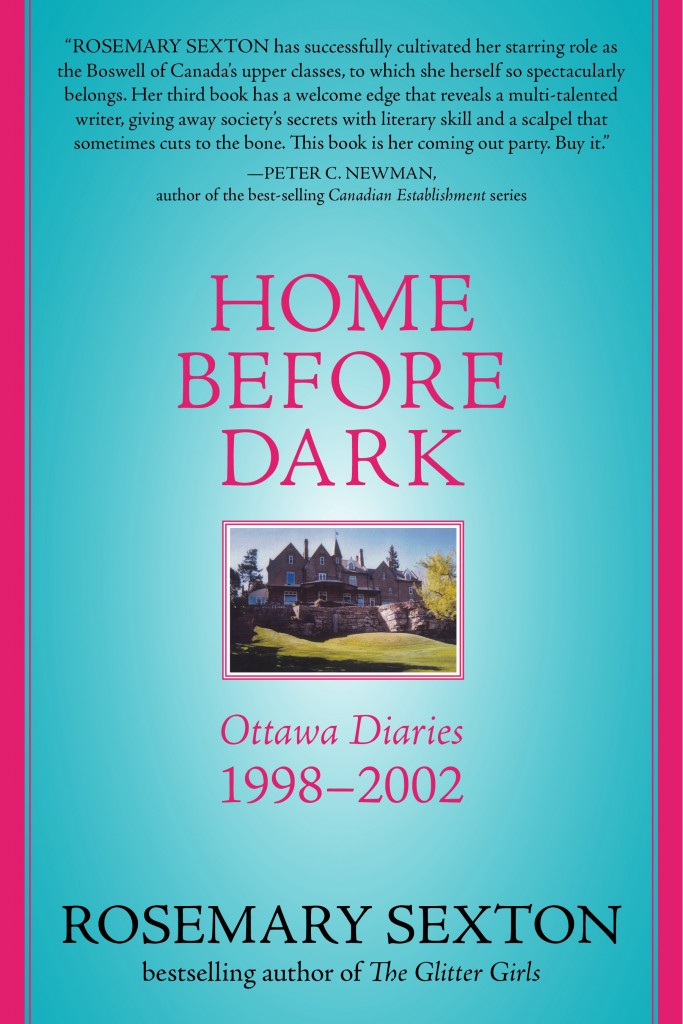Please help rabble.ca stop Harper’s election fraud plan. Become a monthly supporter.
I hardly know what to say about Rosemary Sexton’s book, Home Before Dark, and that’s a rare gift from an author. It’s a rambling, riveting, often trivial diary of her life between 1998 and 2002. Why that span? No particular reason.
Sexton was the Globe and Mail’s society columnist in the 1990s. I met her when she said her Aunt Mary wondered if I was related to the Salutin who sold dresses on Spadina in the 1940s. I was, so she had us to tea in Rosedale. She’d led a complex life and wound up married to the head of a big Bay St. law firm; then he became a federal court judge and they moved to Ottawa.
I suppose the book has some “important” themes if you search them out: along the lines of Wealth and Power in Canada. The people she deals with aren’t really the one per cent (or .01 per cent, which is usually what’s meant), aside from a gobsmacking fishing trip in New Brunswick with the current lord of the Irving dynasty. But she usefully reminds you that there are now and always have been the merely rich and powerful versus that recently added super obscenely loaded (.0)1 per cent. They used to be called the ruling class.
They include the business, legal and political elites who invite each other to dinners where they forthrightly sort out decisions the rest of us naively believed were made in court, parliament or the arenas of public discourse. Her dinner accounts read like gossip — which they are — but they’re also high-quality, essential sociology.
Still, it’s the trivia that sticks to your ribs. The seating arrangements: who’s on her left, her right, across the fondue. Governments call this protocol and take it seriously. Then suddenly she recounts a dream: she’s in a bright red Jaguar at a gas station, puts the nozzle in her mouth in the front seat and tilts her head back (I should add Sexton is one of the beauties of the age, and counting); she opines it may be related to her “recurring urinary tract infections.” When 9-11 occurs in the midst of all this stuff, it’s an aside, like Icarus plunging to his death in the corner of the painting W.H. Auden describes in Musée des beaux arts. He points out how brilliant the Old Masters were to contextualize great events that way. So is she.
I think it’s this randomness that hooks people reading diaries, often in spite of themselves, and gives them an almost metaphysical worth. You never know when disaster will strike, or if you’ll even notice. It gives diaries an edge over essays, which are so focused and thus unlifelike. Also over autobiographies, which are stories concocted from the raw materials of a life, therefore fictions. It’s diaries that get closest to the hapless chanciness of actual, lived life.
Peter C. Newman calls Sexton the Boswell of Canada’s upper classes and Sexton mentions Boswell’s 18th-century diaries. I first heard of them from my friend and mentor Kent Rowley, a radical union leader from the 1930s to the ’70s. He adored Boswell’s journals. It floored me. Boswell was a supercilious snob frantic to meet famous men, seduce trollops and brag about it in his diary. I think for Kent, who had a strong sense of history, it reminded him that any of us could easily have had an entirely other life. It’s not that we can be anything much different from what we are; but we could’ve, under other circumstances. So our sense of freedom is always mixed with a sense of dolour. When Kent died, I inherited his Boswells.
Sexton, unlike Boswell, isn’t a snob; she chronicles all that privilege with no hint of superiority — a neat feat. She shows herself warts and all, which authors often claim but rarely achieve. (Their warts tend to be things like perfectionism.) Near the end, Sexton is trying to prepare a Jewish wedding for her daughter — who’s planning to convert — at their 30-room house in Brockville, though she’s never been to one. Life and its weird challenges, eh? I don’t know if the wedding, or conversion, came off, because the diaries end in the middle, just like life.
This column was first published in the Toronto Star.



